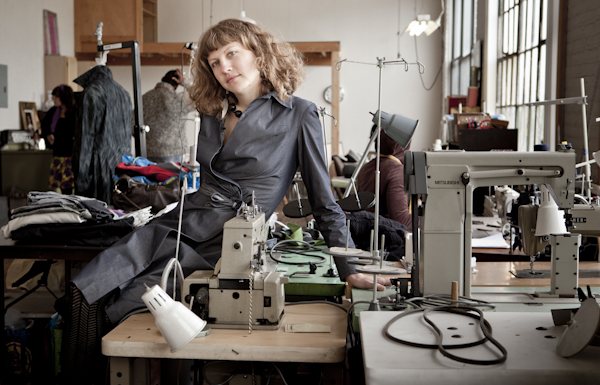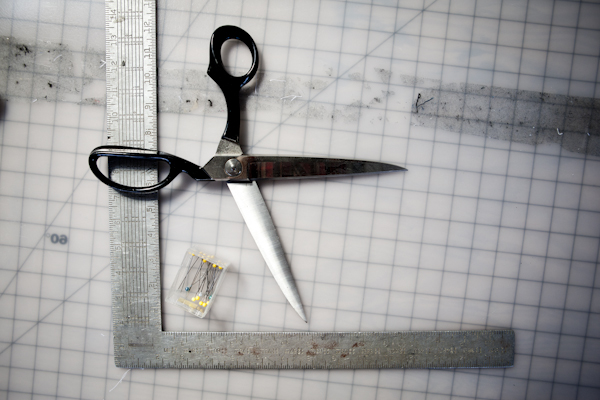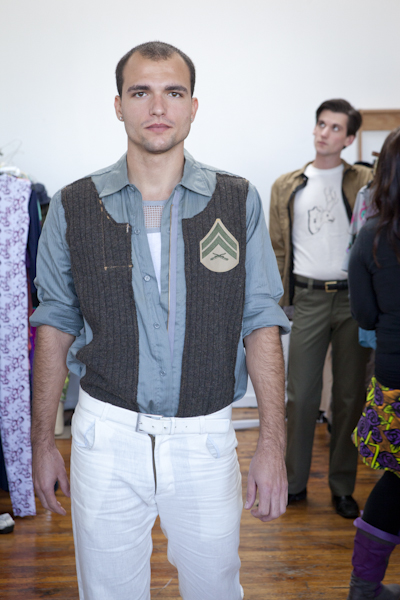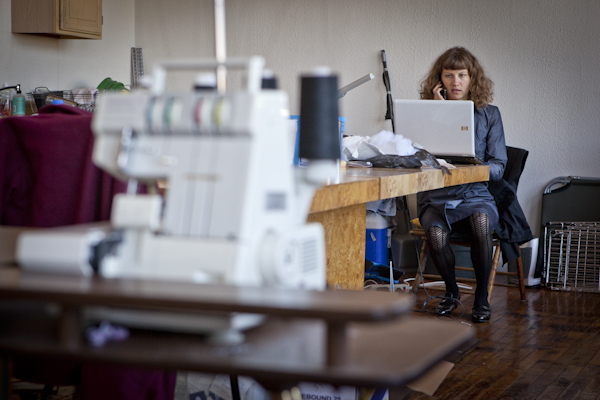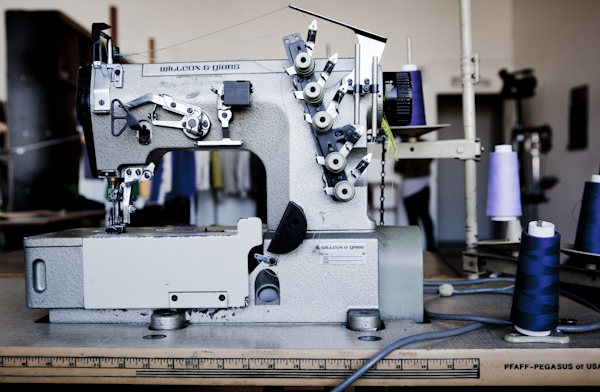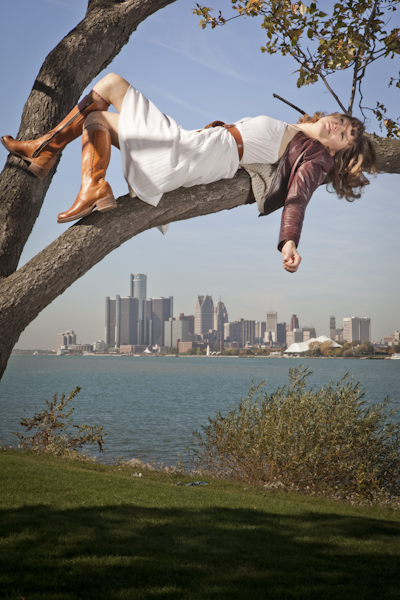The Young & Entrepreneurial: Q&A with Sarah Lapinski of Motor City Sewing and Design
Arty fashionista Sarah Lapinski’s motor is always running. We see this Detroit dynamo wherever we go, her amp usually turned up to 11. She rocks, Jon Zemke rolls it out in this month’s Q&A feature.
It didn’t take Sarah Lapinski long to figure out that Detroit, one of America’s largest cities, is really just a small town at heart.
You can hear it in her voice when the Southfield native talks about friends and family driving her to explore Detroit while growing up or collaborating with like-minded artists in what has become her hometown as an adult. She opened up Motor City Sewing almost four years ago in the Russell Industrial Center. She has since grown that business (and her fashion line WOUND Menswear) into full-time work, recently moving into her own studio space in Corktown.
“It has really taken me for a ride since then,” Lapinski says. “People are knocking on my door all the time with things they need made all the time from prototypes to interiors to samples. It’s not just fashion I am dealing with. I am meeting a lot of really incredible people who are doing interesting things.”
That started when Lapinski received a sewing machine as a gift after graduating from Wayne State University with a bachelor’s degree in Urban & Labor Studies. She dreamed of traveling the world and using it as a tool to help people in developing countries or as the conduit to launch a fashion line in the U.S. And somehow she ended up staying here, marrying a fellow creatively inclined person (painter-musician Davin Brainard), buying a house near the Ford Drive-in Theater, planting an urban garden and starting a business. It’s a place she now happily, and proudly, calls home.
Lapinski invited Model D’s Jon Zemke to her work studio to talk about entrepreneurship, Detroit and fashion.
Q. You have written that Detroit needs a fashion district to help grow its fashion industry. Is this something best done with local government sponsorship, a la TechTown, or allowed to happen organically?
A. A little bit of both. I really see a need for consultation, such as ‘Oh, you want to manufacture? These are the steps you need to go through.’ They don’t teach that at the schools. I would love to have a collective here with a lot of equipment that is privately owned.
Q. You said you did some labor organizing in college. How do you go from labor organizer to entrepreneur?
A. I have always been a little snot. I have always been able to take care of myself and knew what to do. I knew eventually I needed to be my own boss. But I do like to help people improve their lives. I don’t like to see the establishment keep things mucked up.
Q. What should we be doing to make sure we keep more of our fashionable innovators here?
A. There has to be sales and quality product. You have to have product to sell and someone to sell it to. This is a fine place for your HQ. There’s no high rent. You have the freedom. I have never met a more talented and creative bunch of people.
Q The Urbanophile Blog says we should embrace the Detroit brand instead of saying things like southeast Michigan because the Detroit brand is so strong. Do you agree?
A. I totally agree. Anywhere you go in the world people know about Detroit. They have respect and love for Detroit. They know what’s coming out of here, and they appreciate it. My labels say Made in Detroit. That’s a big selling point.
Q. On your Facebook page you said if you don’t travel you’ll just die, which is a common trait for a lot of creatively inclined people. Detroit is always working to keep its creatives here permanently, and sometimes takes it personally when they leave for their next adventure. Considering how much creative people like to move around should Detroit work more toward being a place for creatives to live temporarily instead of focusing on keeping them here long-term?
A. That’s an interesting point. There has been so much media attention on Detroit lately that it’s drawing people here, artists especially. It has a really romantic appeal right now. A lot of them will not make this their home forever. An artist residency program would be successful. You’re still casting your seeds out. They have been here. They have experienced it. They go out into the world and they continue to talk about their experiences here. I would bet they’re mostly positive.
Q. So a Detroit artist residency program could create sort of a Detroit ambassador program?
A. Yes. So many people come here and fall in love with it.
Q. Name something you wish Detroit would do that other major cities that have reinvented themselves have done?
A. I don’t know. I feel like we’re doing a lot of it right now with the Art Prize in Grand Rapids and having the nice riverfront and Critical Mass. There are some great little grass roots things going on here.
Q. What is one of the things that attracted you to Detroit that flies under the radar and how could we turn that into an asset to attract more people like you?
A. You have to be a self-starter. You can work at a restaurant until you make your little money so you can start your business. We need to keep the low-cost of living. I don’t want to see the Russell become expensive and locking people out.
Q. Name one lesson you have learned as an entrepreneur that you would like to make sure everyone starting their own business would know before they do it?
A. Save some money. Your decision-making process is much different if you’re scared about money. Don’t be afraid to go back to working a little bit if you have to. Also, don’t agree to anything over the phone.
Q. Why?
A. It’s a high-pressure environment. You need to be able to sit back and think about it for a little bit.
Q. If your child ever wanted to start a business would you encourage them or nudge them toward a safer choice, like becoming a doctor or lawyer?
A. If they want to start a business, heck yeah. You just don’t know what you’re going to get.
Jon Zemke is a writer for Model D and the News Editor for its sister publications, Metromode and Concentrate.
